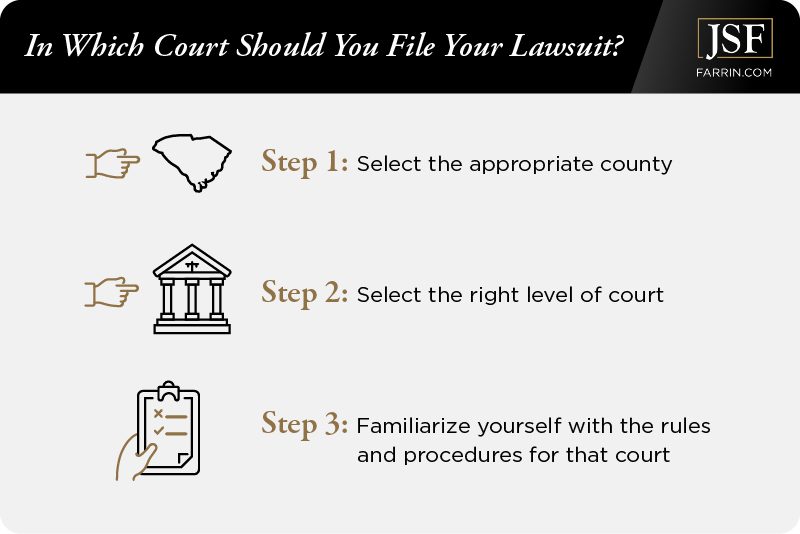
First, you can hire a personal injury attorney to handle your case. An attorney will know the law, the rules, and how to build your case and keep it on track. Second, you can file suit on your own without a lawyer.
For most cases, we don’t recommend filing a lawsuit without the help of a personal injury lawyer, but if you choose to do so, here are some things you should know. Throughout the article, I’ll share my thoughts on what pitfalls you might encounter pursuing an injury lawsuit on your own, and how to try to avoid them.
Have You Already Filed a Personal Injury Claim Against the At-Fault Insurer?
Before you head to the courthouse, is a lawsuit really necessary? A personal injury lawsuit usually begins with a denied personal injury claim against the insurance policy of the other party. If you have not filed an insurance claim, you should do so before you proceed to file a lawsuit. Note: Filing an insurance claim does not suspend the statute of limitations (the amount of time you have to initiate a lawsuit).
If the other person does not have an applicable insurance policy to cover your personal injury, then you may need to proceed to file a lawsuit. Here are some common injuries and the insurance policies that might apply:
- Car accidents typically involve the other driver’s car insurance policy, but there may be more. For example, if the driver does not own the car, you might have a claim against the owner’s insurance policy, even if the driver is uninsured.Multiple policies may also apply. For example, if both the driver and owner are insured, you may have a claim on both policies.
- Accidents on private property generally mean a claim against the owner’s insurance policy. For example, if you fall and hurt yourself because of a hazard on someone else’s property, you may file a claim against that policy.
- Dog bites in South Carolina may be covered by homeowner or property owner insurance policies. There are, of course, different rules that may apply depending on the circumstances (public property versus private property, for example).
- Medical malpractice injuries can be claimed against the practitioner’s malpractice insurance, which most medical professionals are required to carry.
You might be surprised by what some insurance policies cover, and you might also be frustrated at how evasively they can be worded and what they don’t cover. Filing an insurance claim means trying to locate all applicable policies, analyzing them, and claiming appropriately.
Skipping this step could undermine your pursuit of compensation.
What Could Go Wrong
Filing a lawsuit without filing a claim may be a waste of money, especially if the insurance company is willing to make a reasonable offer (though our experience indicates that getting a fair offer often requires negotiation).
If you’ve simply refused to speak to the insurer, that may also work against you. It’s often best to save a lawsuit until you absolutely need to use it – such as the insurer acting in bad faith.
In Which Court Should You File Your Lawsuit?
If your insurance claim is denied, you may choose to file a lawsuit in either 1) the county in which the accident and injury occurred or 2) the county in which the defendant lives. Once you’ve identified the county, you can file a personal injury lawsuit in a couple of different courts, and the court depends on the amount of damages you believe you’ve suffered.
What Could Go Wrong…
If you handle discovery poorly, your lawsuit is in trouble. Keep in mind that each one of these methods requires very specific steps, and there are costs involved – a single deposition may cost $1,000, for instance.
You will likely lose if the other side has more evidence than you do to support their side of the case. If you mistakenly share information you shouldn’t or fail to share information you should, you could suffer financial and legal consequences.
The Next Stage: Mediation or Trial?
Most personal injury lawsuits are settled in mediation.
At a mediation hearing, you and the opposing side will, through a mediator, attempt to resolve your complaint before going through the trouble and expense of a trial. The mediator is a neutral party who will weigh the evidence and recommend to the parties some sort of compromise. If you cannot come to agreement, you might then proceed to trial.

Taking Your Case to Trial
If you want to take your case to trial without an attorney, you’ll have to carefully handle everything yourself, from jury selection to opening statements to closing arguments. You’ll have to cross-examine witnesses and conduct all facets of the trial while staying in the court’s good graces – knowing when and how to do things like object or request a continuation.
As I mentioned earlier, the court and judge are not present to educate or advise you. If you choose to self-represent, you’ll be expected to know what you’re doing. If the defendant has a lawyer (and they almost certainly will, if an insurance company is involved), you can bet that they’ll be ready to pounce on any mistake. If you’ve managed to get this far, this is the most critical part of your case.
NOTE: If you or the defendant appeal the verdict of your case, it could proceed to higher courts, including levels where a lawyer who is admitted to practice before that court is required.
What Could Go Wrong
Obviously, a lot can go wrong at these stages. The biggest mistake in mediation is settling for too little. And if you proceed to trial, losing there can be a double whammy. Not only might you not get any compensation for your injury, you may be on the hook for the defendant’s legal fees. The insurance company’s attorneys are unlikely to go easy on you.
Am I Required to Hire an Attorney to File a Lawsuit in South Carolina?
No, South Carolina law generally does not require you to hire a lawyer to file a lawsuit. However, an attorney is advisable in most personal injury lawsuits. South Carolina law has many pitfalls that can trap the unwary and strand them with no relief. An insurance company is likely to be delighted to hear someone is self-representing.

But that’s just not always how it works.
Contact the Personal Injury Lawyers at the Law Offices of James Scott Farrin
If you’re considering filing a lawsuit, consult an attorney. My firm offers a free case evaluation with no obligation to hire us afterwards.
Our firm has more than 60 attorneys – including a team dedicated to litigation – and the resources to fight for you. We work on a contingency fee basis, meaning we advance all the costs of building your case and you don’t pay us an attorney’s fee at all unless we get compensation for you. Guaranteed.2
That guarantee, combined with our You-First Policy, often gives clients peace of mind.
We recovered more than $240 million in total compensation for more than 5,000 people in 2024. Since 1997, we’ve recovered more than $2 billion in gross compensation for more than 73,000 people. And counting.1
Call us now at 1-866-900-7078 or contact us online. We’ll be in touch shortly.





